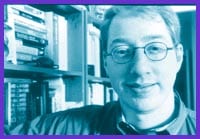Toronto’s Jewish community is ready to accept gay Jews in casual, surface interactions – but that’s it.
“I was naïve when I started the study,” says McGill University student Randal Schnoor. “I expected to hear more stories of blatant homophobia in casual interactions. Like rabbis in Orthodox synagogues going up to confront gay men to say that they don’t have a right to pray there. But most people don’t work that way.”
Instead Schnoor has heard countless tales of the subtler rejection of gay men and lesbians in Jewish organizations, from Orthodox to secular: the inability to get married in most Toronto synagogues, being denied conversion to Judaism, and the children of queer parents being refused public baby naming. The sociology PhD candidate is interviewing more than 30 Jewish gay males in Toronto as part of his research on how men negotiate being both queer and Jewish.
“Everyone has a different way of dealing with it,” says Schnoor. “Some become activists and struggle for change, others become bitter and others withdraw and don’t want anything to do with anything Jewish.”
“The Toronto Jewish community,” says Schnoor, “is probably one of the most conservative in North America.”
One interview was with Johnny Abush (who died last fall), the founder of an archive that included more than 10,000 artifacts of gay Jewish life. Abush’s collection has been relocated to a museum in Los Angeles.
“I think it says a lot about Toronto that there isn’t the money or the will to keep the archive here,” says Schnoor.
Despite frequent rejections from local Jewish authorities and organizations, Schnoor found that Jewishness dominates queerness. “Jewish identity is powerful because it is at once a religious system and a very strong ethnic system.”
Jewish cultural values, like the importance of child-rearing, frequently govern the men’s priorities. “Most of the younger men I interviewed wanted children. I haven’t done comparison studies, but I suspect that this is a higher percentage than in the gay community as a whole.”
The men interviewed also experienced institutionalized exclusion in the gay community. “They complained of things like having important gay events or planning meetings scheduled on major Jewish holidays when almost no Jews could attend.”
The positive side of Schnoor’s findings is the blossoming of events and organizations in Toronto to fight the isolation that he has uncovered. Schnoor has attended a dozen events around town just for gay Jews, including religious services, film screenings, historical lectures, social events, activist groups and student gatherings.
The study focusses on gay men because – contrary to usual gender patterns, according to Schnoor – there are actually fewer resources for and about queer Jewish males than females.
Schnoor has focussed all his research as a sociologist around the variety of Jewish experiences in North America. “I am interested in debunking stereotypes about the Jewish community,” he says. “But before I started this study I was your typical straight Jewish man. I wasn’t aware of all the heterosexism and homophobia.”

 Why you can trust Xtra
Why you can trust Xtra


